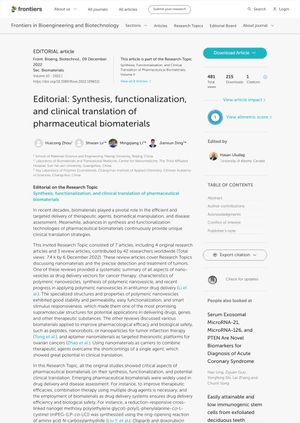Editorial: Synthesis, Functionalization, and Clinical Translation of Pharmaceutical Biomaterials
December 2022
in “
Frontiers in Bioengineering and Biotechnology
”

TLDR New pharmaceutical biomaterials, especially nanomaterials, show promise for improving cancer treatment and disease diagnosis.
The research topic, contributed by 42 researchers, consists of 7 articles discussing the synthesis, functionalization, and clinical translation of pharmaceutical biomaterials, particularly nanomaterials, for disease treatment and assessment. One review systematically summarized the use of polymeric nanovesicles as drug delivery vectors for cancer therapy, highlighting their stability, permeability, easy functionalization, and smart stimulus responsiveness. Other reviews discussed the use of peptides, nanorobots, nanoparticles, and aptamer nanomaterials for tumor and ovarian cancer treatment. The original studies demonstrated the use of biomaterials in drug delivery and disease assessment. For instance, a reduction-responsive cross-linked nanogel was synthesized for targeted cancer therapy, and a biomimetic nanoparticle was used for the treatment of androgenic alopecia. Another study synthesized metformin carbon nanodot to promote odontoblastic differentiation of dental pulp stem cells for pulp regeneration. The research topic also emphasized the need for evaluating the biological distribution of nanoparticles in tumor microenvironments.



